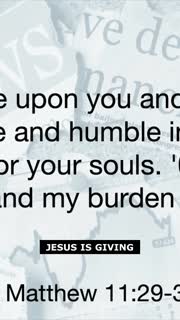Transforming Offenses into Opportunities for Grace
Devotional
Sermon Summary
Bible Study Guide
Sermon Clips
1. "I want to let you know that these are all kind of unhealthy ways to do it, right? And so we're going to see an example of that. We're going to see an example of another way in our Bible passages today. And we're going to look at a very unknown story. It's the story of David, right? In the book of Samuel. And it's three characters I want you to be aware of, all right? Again, it's David, it's a man named Nabal, and his wife, Abigail." [12:54] (26 seconds)
2. "Offenses cause people to walk away from communities that love them. You know, I spoke to my niece this week, right? She called me, as she often does, and she was struggling with, you know, finding community in church. And she told me that the reason, why she struggled so much is because when she was about 10 or 11, she was at a church and it was so cliquish. It was so many different cliques that were excluding her, right? And over time, experiencing this, this caused her to have what we call church hurt." [20:08] (34 seconds)
3. "So what should we do? We got to learn how to properly navigate so that how we respond don't have a long-term effects, right? What I'm talking about, when we face offenses over and over, and whether we bottle them up or whether we react, they can have some long-term effects, effects like family members that we don't talk to, right? Relationships that are shattered, friendships that we don't trust anymore, even churches that we walk away from." [18:46] (34 seconds)
4. "Jesus is giving a great remedy here when we're burdened by these thoughts we're burdened by what that person said what that person did Jesus said look take my yoke upon you my yoke is easy it's like why because i am humble of heart so Jesus is teaching here teaching us that humility of heart is a way to having a light burden sometimes sometimes pride can cause us to carry the burden of what others said or has done to you." [26:11] (25 seconds)
5. "We can't react the way the world says that we should react because the world says that we should be at each other's throats right the world says is one party it's the other and nothing they should never ever find common ground or anything right right now I believe us as a church we should have an elevated view of the world and each other through the lens of Scripture even if we don't agree guys here's the thing we cannot you know we can't we can't we can't we cannot we cannot we cannot demonize each other as the world does." [30:32] (32 seconds)
6. "So here's my question to you. How often are you praying for those who offend you? How often? You know, as I talk about this today, as I close this up, I want you to know, I'm not talking from a place of theory. I'm not talking from a place of just ideas. This is something that I worked through, you know, before I came to one church, I was in a place, where I was experiencing a lot of tension. And again, there was a lot of perceived insults, a lot of perceived attacks coming from me." [35:40] (32 seconds)
7. "So this is what I want to encourage us with the last tool to navigate through offenses is to just know who you are in God. Listen, when people throw darts at you, when they say things about you, when they do things towards you, we can have a confidence to know that none of those things can impact who I am. None of those things can truly impact my purpose. None of those things can truly impact my destiny because those things are secure with my heavenly father." [38:38] (26 seconds)
8. "And we will be on the path to healing all the broken areas. I just want to take a moment to pray for you. I don't know what you're experiencing right now, what your experience has been, but I want to pray that there's a elevation of the security that you have in God. Let's pray. Lord, I thank you so much because you in your divine way could see each and all of your children and show love. So I ask that right now, God, you help us to reflect more of your heart, reflect more of your character to those around us." [40:08] (32 seconds)
Ask a question about this sermon
2. "Offenses cause people to walk away from communities that love them. You know, I spoke to my niece this week, right? She called me, as she often does, and she was struggling with, you know, finding community in church. And she told me that the reason, why she struggled so much is because when she was about 10 or 11, she was at a church and it was so cliquish. It was so many different cliques that were excluding her, right? And over time, experiencing this, this caused her to have what we call church hurt." [20:08] (34 seconds)
3. "So what should we do? We got to learn how to properly navigate so that how we respond don't have a long-term effects, right? What I'm talking about, when we face offenses over and over, and whether we bottle them up or whether we react, they can have some long-term effects, effects like family members that we don't talk to, right? Relationships that are shattered, friendships that we don't trust anymore, even churches that we walk away from." [18:46] (34 seconds)
4. "Jesus is giving a great remedy here when we're burdened by these thoughts we're burdened by what that person said what that person did Jesus said look take my yoke upon you my yoke is easy it's like why because i am humble of heart so Jesus is teaching here teaching us that humility of heart is a way to having a light burden sometimes sometimes pride can cause us to carry the burden of what others said or has done to you." [26:11] (25 seconds)
5. "We can't react the way the world says that we should react because the world says that we should be at each other's throats right the world says is one party it's the other and nothing they should never ever find common ground or anything right right now I believe us as a church we should have an elevated view of the world and each other through the lens of Scripture even if we don't agree guys here's the thing we cannot you know we can't we can't we can't we cannot we cannot we cannot demonize each other as the world does." [30:32] (32 seconds)
6. "So here's my question to you. How often are you praying for those who offend you? How often? You know, as I talk about this today, as I close this up, I want you to know, I'm not talking from a place of theory. I'm not talking from a place of just ideas. This is something that I worked through, you know, before I came to one church, I was in a place, where I was experiencing a lot of tension. And again, there was a lot of perceived insults, a lot of perceived attacks coming from me." [35:40] (32 seconds)
7. "So this is what I want to encourage us with the last tool to navigate through offenses is to just know who you are in God. Listen, when people throw darts at you, when they say things about you, when they do things towards you, we can have a confidence to know that none of those things can impact who I am. None of those things can truly impact my purpose. None of those things can truly impact my destiny because those things are secure with my heavenly father." [38:38] (26 seconds)
8. "And we will be on the path to healing all the broken areas. I just want to take a moment to pray for you. I don't know what you're experiencing right now, what your experience has been, but I want to pray that there's a elevation of the security that you have in God. Let's pray. Lord, I thank you so much because you in your divine way could see each and all of your children and show love. So I ask that right now, God, you help us to reflect more of your heart, reflect more of your character to those around us." [40:08] (32 seconds)








